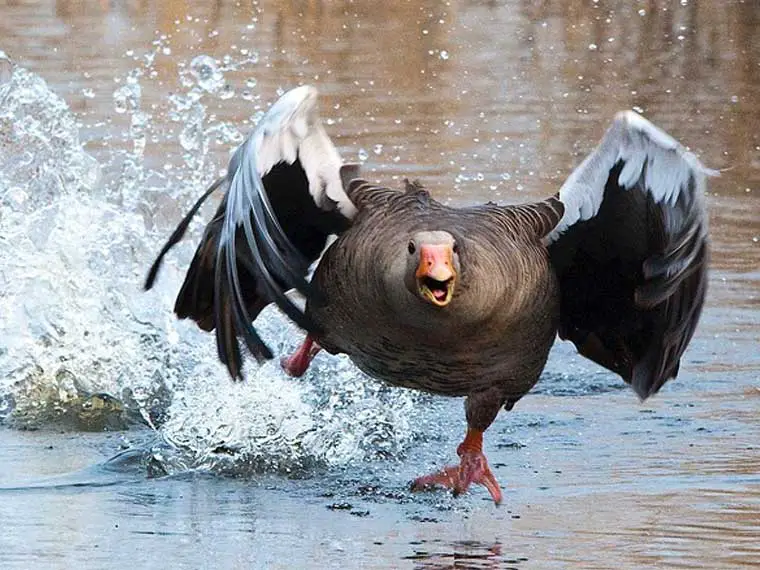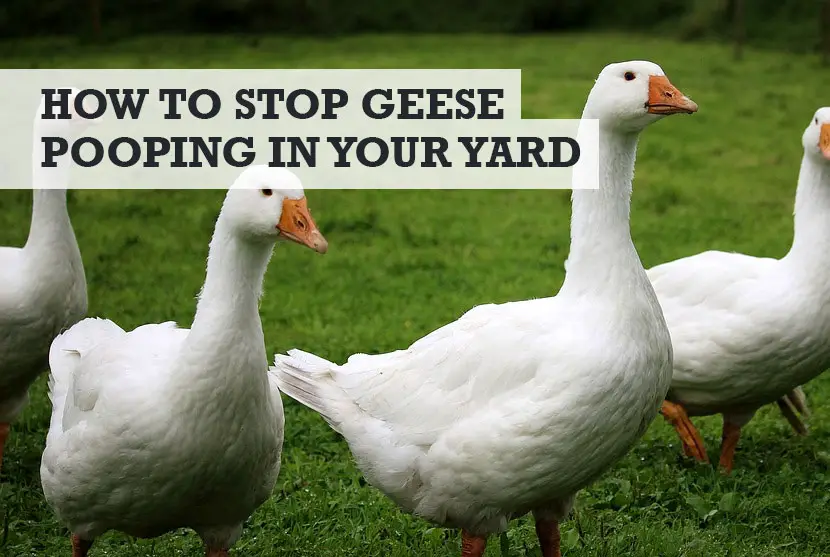Geese are spectacular to watch in flight, but they quickly become less appealing when they’ve invaded your outdoor living spaces and lawn. They’ve most likely come for their favorite meal, your grass. But unfortunately, these uninvited guests don’t just eat and run.
Geese will stay and poop in your yard, creating a disgusting, unsightly and unsanitary mess on your lawn and property. Goose poop isn’t just an assault on the senses, it’s also full of bacteria and sometimes contains viruses that can be transmitted to pets and humans.
With that in mind, here are the best ways to stop geese from pooping in your yard.
How to stop geese from pooping in yard
1. Eliminate food sources
As tempting as it may be, feeding the geese will only make it more difficult to get rid of them when their charm wears off. Their friends will show up and expect the same hospitality.
If you can dissuade your neighbors or others from feeding them, this will be the quickest way you can stop geese from pooping in your yard. It could be as simple as placing a sign that reads similar like, “Please don’t feed the geese.”

Besides attracting more geese and ultimately more bird droppings, feeding the birds has other negative consequences. Human food doesn’t sit well with the digestive system of geese which causes the geese discomfort and consequently, more goose poop in your yard.
You may not be offering the geese treats directly, but geese aren’t choosy. The other sources of food, such as birdfeeders, pet bowls and compost, draw geese into the yard. Keep pet food inside or tightly covered when stored outside. Be sure to use a birdfeeder that is situated up high and out of reach of the geese.
If you compost on your property, it’s important to keep food scraps covered or at least inaccessible with wire mesh or some other enclosure. Using a decoy near the compost pile deters geese from approaching the area.
You can also place some reflective material in and around the compost bin to repel geese naturally.
2. Employ decoys
Placing a few decoys around your property is completely harmless and one of the easiest ways to keep geese out your yard. Geese will usually avoid any area occupied by its predators, and therefore will stop pooping in your yard.
Coyote decoys (like this one on Amazon), as well as bobcat, fox and raccoon decoys, are enough to for geese to perceive a threat. Use a swivel to allow the decoy some movement from the wind to make it less static.
If your decoy is stationary, it may be more convincing to the geese if you change the decoy position every other day. And be sure to place the decoys away from tall trees or other objects that may obscure the decoy.
Geese can spot these pretend predators from the air and may choose not to land on your property to begin with if they spot what appears to be a predator. Geese will also recognize the form and shape of their predators, so the detail is unimportant.
If you want to make the decoy instead of purchasing it, just create a cutout of the animal form, attach it to a dowel rod or stick and station it in a open space.
3. Use reflective deterrents
Another method on how to stop geese from pooping on your yard is to use reflective 2-inch holographic or Mylar strips. These provide an easy deterrent to keep geese at bay.
The reason being a goose’s highly developed eyesight is sensitive to movement and light. When reflective strips are placed in areas where they’ll reflect sunlight and can blow in the wind, these strips create flashes of light that distress and scare the birds therefore help prevent goose poop.
Ideally, you’ll want the strips to dangle for movement, but they can also be tied around trees, planters or woven into chain link fences.
You can also use reflective pinwheels (view on Amazon) as these are a good addition or alternative to the reflective strips and tape and they are budget-friendly. They come in all sizes and can be placed directly in and around your lawn or garden where they can catch the sunlight and a breeze.
You can even recycle retired compact discs you no longer use by removing the label and attaching them to string or twine to hang and blow in the wind. Tin cans, foil and mirrors create the same effect and can usually be found around the house.
I’ve used this method and will always recommend it when someone asks me how to prevent goose poop in backyards.
4. Adapt your landscape
If you find the geese returning year after year (therefore so does the goose poop), it may be that they find your type of grass particularly appetizing. Geese have a taste for bluegrass and Bermuda grass, but they will usually pass on other grasses like Tall Fescue, euonymus and Japanese pachysandra.
It’s obviously not going to be practical to replace your lawn but even letting it grow out to at least 6 inches often provides a good deterrent since geese feel vulnerable to predators in tall grasses.
Adding a liquid goose deterrent (view on Amazon) to the lawn that contains natural, harmless chemicals, like methyl anthranilate, will make the grass unappealing to geese.
Derived from grape extract and completely harmless to pets and humans, the liquid irritates the goose’s eyes and airways enough to make them look for a more appealing food source.
Another way you can scare geese off from pooping in your yard is a motion detecting water sprayer. Consider installing one where the geese like to congregate in your yard.
The sprinkler connects to a water hose for mobility and can deliver a powerful spray, with some reaching up to 100 feet away – you can set it to only trigger when it detects an animal the size of a goose – you can buy them on Amazon.
Place them at entry ways onto your property or where they like to munch on your grass. Alternatively, if you spend a lot of time outside in your yard, you can spray the geese with a water hose with a strong sprayer for the same effect.
5. Block off any routes
Geese don’t always fly into land and do their pooping. Often it will be an open gate or low fence that they decide to navigate – they might waddle into your yard, eat, then poop and be gone before you know it.
Think about the entrance points to your yard or making it more difficult for them to simply walk right in and make your backyard their lavatory.
I also saw this great tip on Quora which involves making the life of geese difficult when you have a pond in your yard.
You can’t stop them from pooping if they are in your yard, but you can stop them from coming into your yard. Get a few stakes and some brightly colored string. Place the stakes about 10 feet apart around your yard. Tie the string to the stakes about 1 foot off the ground. The geese do not like to have to “Fly” to the water. They want to be able to run to the water. At 1 foot high, the string is too low to duck under and too high to step over. The geese will find a different yard to do their business in.
6. Scare the geese away
This one unfortunately requires you to be on red alert for geese. Once you see them out in your backyard pooping, open the door, make a lot of noise, and even consider getting the hose out.
Whilst they might come back once or twice again, the more you repeat this action, the quicker geese will learn they are not welcome in your yard for their pooping business.
7. Let the geese know this is your dog’s territory
Let me be clear, I do not advocate you let a dog loose on geese. Far from it.
But what I do recommend is that your dog has open access into your yard. If the geese know there is a potential predator in the area, they won’t even attempt to come into your yard.
8. Reach out to wildlife experts
If you’ve tried everything and geese are still pooping on your lawn, it may be time to call the wildlife experts in your area or a pest removal service. They can safely remove the birds and relocate them where they won’t be a nuisance to anyone.
Even if you only have a few of the troublesome geese that refuse to vacate your space, it’s better to contact an expert rather than trying to capture the geese yourself and risk injury to yourself of the geese.
Conclusion
Geese can also be very aggressive, especially when guarding a nest or fledglings. That’s why it can be so tricky to stop them pooping on your lawn and yard.
These birds are surprisingly smart and tenacious and can be reluctant to give up any good feeding spot near water. But they can be driven away if grazing on your lawn is unappealing or it becomes too much of a threat or perceived threat to remain.
Be aware though, the Canada goose is protected by The Migratory Bird Treaty Act of 1918, harming or killing these imposing creatures and their fledglings is illegal without a license or permission from the U.S. Fish and Wildlife Service.
You’ll have to be careful, strategic, and persistent when stopping geese from pooping in your yard or on the lawn. That’s why I recommend employing methods that are effective but harmless to your lawn and to the geese.
You might also like…
- How to stop squirrels digging up your bulbs and planters
- How to stop racoons from pooping in your yard
Image in header via https://pixabay.com/photos/geese-white-poultry-birds-farm-2655516/





